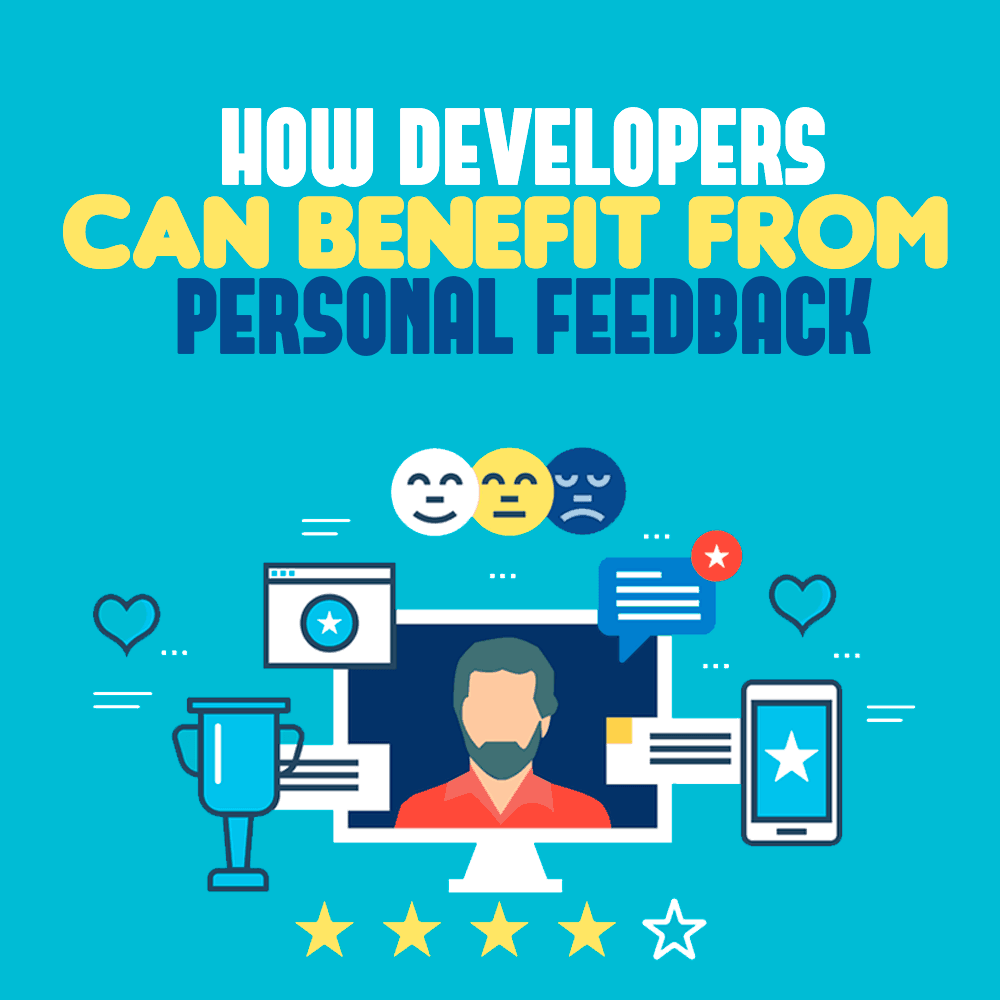
Breathe easy—the team just finished a grueling sprint. Heated exchanges, passionate arguments, and pressing deadlines are behind you.
It’s time to move on. But then—your project manager calls for a team meeting. And the grilling begins. It’s all about what you did wrong and how you messed up.
Your blood starts to pump. You see red. After all the hard work you put in, now you’re hearing about what you did wrong, not what you did right.
Don’t take it personally; it’s part of the learning process, and not everything will go smoothly. Listen to the feedback and you will improve as a developer.
In this post, you’ll learn how personal feedback helps you grow by improving your personal skills, making you a better team player, and helping you identify your future goals and aspirations.
You’ll also learn how to take personal feedback, in order to reap all of its rewards.
Let’s get started on your journey to being a top-notch developer.
Personal Feedback Develops Your Personal Skills
Developers tend to focus on their technical skills, and for good reason. After all, it’s the bread and butter of what makes you an indispensable team member.
And yet it’s crucial to remember that negativity and lack of emotional intelligence are often reasons that employees get fired.
Your personal side is just as important as your technical abilities. Project managers do not want people around who spread negativity through their department. They don’t want to tiptoe around you for fear you aren’t able to deal with constructive criticism.
Enter the world of personal feedback.
When you take on constructive criticism, you gain valuable soft skills as a developer:
- Open-mindedness – Don’t be labeled the bull-head. Developers must be ready to change their opinions and not be locked into thinking their way is the only one. Feedback helps open your mind to what others offer as a new solution to the problems you face.
- Honesty – Admitting your mistakes is hard. It happens to everyone. Personal feedback helps you admit these mistakes. It helps you learn from them and avoid them in the future.
- Creativity – Part of being a great programmer is being able to think outside the box and be innovative with your solutions. But it doesn’t mean you have to reinvent the wheel every time a problem comes up. Getting personal feedback helps enrich your approach to a problem by brainstorming with others what better solutions are available.
- Listening skills – When you take personal feedback, it helps you become a more effective listener. Your listening becomes more active. You listen to hear what others are saying and then you respond to show that you understand. It helps reduce defensiveness, promote self-esteem, and defuse emotional exchanges.
- Interpersonal skills – Personal feedback improves interpersonal skills pivotal for any employee—interrelated abilities such as active listening, conflict resolution, and effective communication with others.
Why are such skills so important to a developer? It’s simple: Developers with these skills are able to function in a team, which is often a decisive factor when an employer has to choose between letting two equally qualified candidates go.
The takeaway is this: Personal feedback helps you build your personable side and is crucial in how well you get along with your colleagues.
Personal Feedback Improves Your Career Growth
Your technical skills blossom when you have grueling sprints to complete your projects.
Your personal skills grow from personal feedback.
But what about your career growth? Can personal feedback help?
Absolutely.
It helps you identify future goals and aspirations. Here’s how it works: Your manager tells you what you need to improve on, so you are able to find out what went wrong and where you can improve.
This improvement is critical for career growth. You are able to set goals to identify how you can become better and achieve the best growth imaginable in your career.

You get a greater awareness of what needs to be changed, but it also signals to your team leader how you are improving and in what ways you are growing as an employee. This helps you succeed in your current situation.
Additionally, it helps you know what you want to do next in your position and career. Let’s say you want to expand your current role. You know you have weaknesses when it comes to certain languages or programs. But you want to get better at them to be able to become a senior developer or possibly a team leader.
Getting personal feedback from others helps you understand what your current level of mastery is and how to make it better. This allows you to build on your skills and to show upper management you can take on bigger and better projects because you are now able to handle them.
It’s a surefire way to speed up your skills and know what to work on so you are first in line for that promotion! Or if you’re looking for other developer jobs, make sure to highlight them in your resume—it’s what can set you apart from the fierce competition out there.
Transform Into an Invaluable Team Player
What happens when programmers grow their personal skills and come together to work as a team?
It makes them unstoppable.
When you take personal feedback and apply it to the team level, everyone and everything benefits—programmers, processes, and management.
Here’s what the use of personal feedback does to improve the overall performance of the team:
- Creates shared context – Imagine everyone on the team offers feedback to one another. Ideas are welcome and discussed. It helps build team awareness and stability when it comes to tackling issues that everyone struggles with. It enables a more transparent atmosphere and takes much of the pressure off your shoulders when others have similar responsibilities.
- Creates shared success – When one team member succeeds, the team does as well. Personal feedback removes the lone-wolf programmer mentality and distributes wins and losses in a better way.
- Deepens the team’s technical experience – The team’s performance gets an overall boost when individual team members benefit from personal feedback. Developers work with technologies and become experts. When they share this knowledge through constructive criticism, everyone benefits.
- Unlocks change and innovation – No matter what sector a business is in, change and innovation are necessary. Personal feedback pushes each team member to improve their skills and adapt to the latest technology.
The benefits of personal feedback can be substantial. But the real question is, how do you receive constructive criticism without making it personal?
How To Take Personal Feedback
Receiving criticism can be difficult, as open and heated discussions might happen.
First, make sure to keep your cool and make the exchange as professional as possible. If you feel the exchange is unprofessional, ask your team leader or others to give concrete examples for the criticism.
If you go into the process driven by your ego, you won’t benefit from personal feedback. You must reframe the process from scratch. You need to hear the feedback differently. Try to focus on the larger picture in a difficult situation and ask what you are supposed to learn from this.
Most of the time, the feedback isn’t just about you. It’s about the process as a whole, but you can develop by understanding how to improve your role in this process for the next time. You have to think big picture and focus on the larger project at hand.
Finally, make sure you request time to follow up when getting personal feedback. You must take time to reflect on what was said and how you should change. Or you might think of giving some pushback on certain points. But remember to pause and not react at the moment; take some time to think it over.
Embrace Feedback to Supercharge Your Growth

It’s hard to be a top-notch developer. But remember that the quickest way to improve your personal and technical skills is to embrace the process of personal feedback.
Don’t pass on this opportunity to develop. You now understand what feedback can offer you as a programmer. It has tremendous benefits to offer now and in the future. Go forth knowing you are mentally prepared to receive it.
It’s a surefire way to get ahead and be the best programmer starting today.
